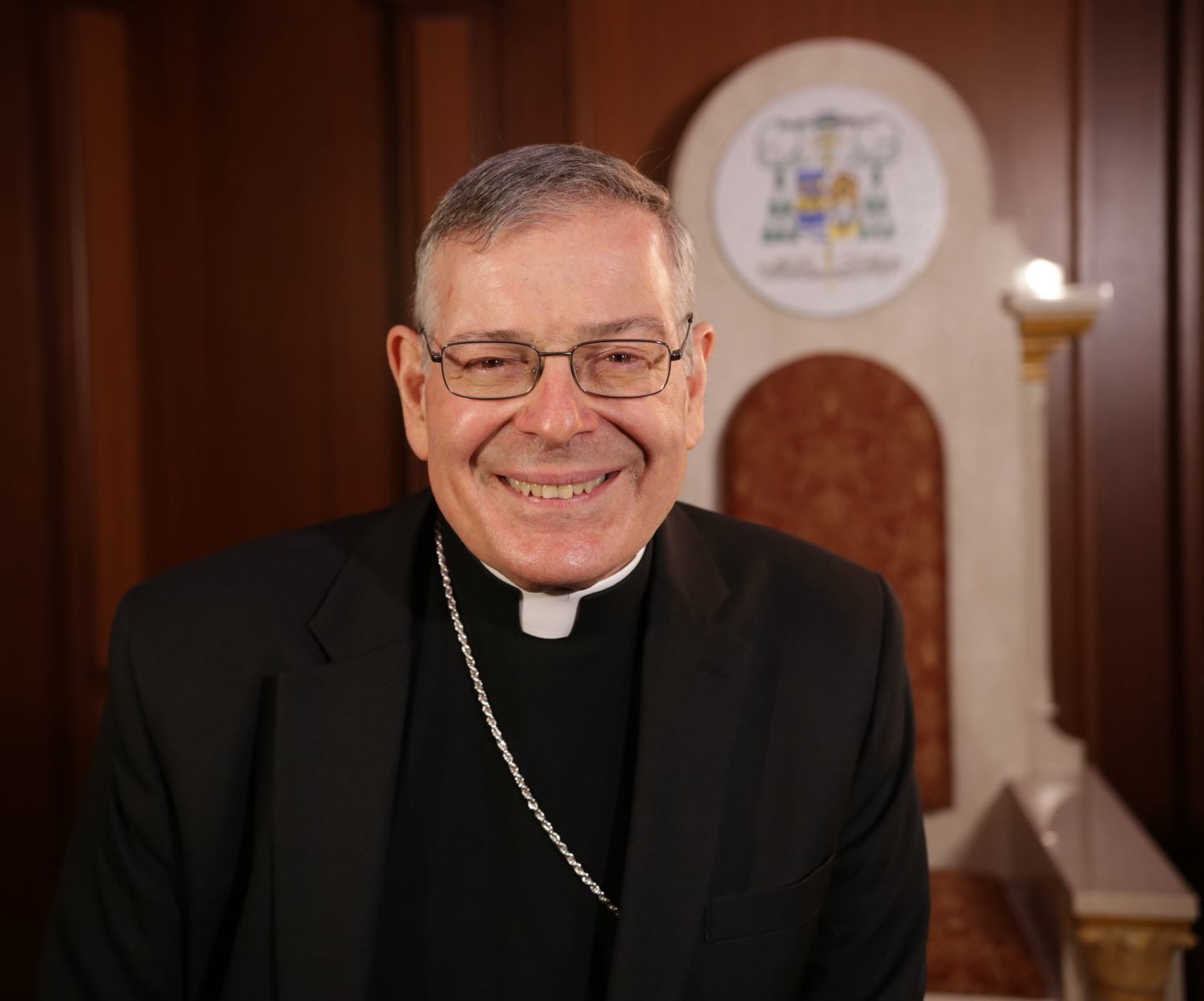
The following is the text of Bishop Barbarito’s homily from the April 4 chrism Mass.
“The Lord Jesus, whom the Father anointed with the Holy Spirit and power, guard and preserve you that you may sanctify the Christian people and offer sacrifice to God.” These are the words which the bishop prays when he anoints with chrism the hands of a newly ordained priest. All of us, as priests, heard these words, or ones similar to them, on the day of our ordination. They remind us of what is essential to our priesthood — sanctifying and offering sacrifice to God. These two mandates become one in the Eucharist when the priest uses his anointed hands to celebrate it. As every priest vividly remembers, his hands carry the fragrance of the chrism after the anointing. While this fragrance naturally fades away, the priest keeps it and intensifies it in a more powerful manner as he carries out his ministry of sanctifying and offering sacrifice. “The Lord Jesus Christ … guard and preserve you that you may sanctify the Christian people and offer sacrifice to God.”
Last month, we celebrated the 10th anniversary of Pope Francis’ election as the Vicar of Christ. There have been many recollections of what he has spoken of and events he has carried out during those years. One of them refers to the words he spoke at his first chrism Mass on Holy Thursday, March 28, 2013. It was on this occasion that he used a phrase which has become so well characteristic of him when he said to the priests: “This I ask you: be shepherds, with ‘the smell of the sheep,’ make it real. Be shepherds, with ‘the smell of the sheep.’”
The pope has used this exhortation regarding the smell of the sheep frequently since then, and it has taken on a definitive character in the succeeding 10 years. By it, Pope Francis means that the priest is to be close to the people so that he knows their personal situations and serves them well. He emphasized, in his homily, that the role of the priest is “unction” not “function.” It is being anointed for sanctifying and offering sacrifice. It is holiness and the growing in that holiness that defines priesthood and not the success of effective management, as important as that may be.
I would like to suggest that while, rightly, Pope Francis emphasized that priests should want to have the “smell of the sheep,” he also reflected that the sheep should want to have the smell of their shepherd. That smell is best characterized from the anointing with chrism on his ordination. It becomes more intense as the priest carries out his ministry of sanctifying and offering sacrifice when it cannot be sensed as a strong aromatic fragrance as on the day of ordination, but as a powerful spiritual one through priestly relationship. This relationship is first and foremost with God and then with the people. The fragrance always arises through prayer as essential to ministry. On many occasions, Pope Francis has stressed that the most important aspect of a priest’s ministry, from which all other aspects flow, is prayer.
We priests can never become more satisfied with our function that our unction. We can never become so busy and occupied that we cannot pray because it is then that we are being removed from our people. The aroma of the shepherd is evident and causes people to seek the priest for what he truly is: a priest in the unction of his person and not a person in the function of an office. A humorous story is told of the true spirit of prayer as two priests were on a transatlantic flight holding their breviaries in their hands while they were reciting the Liturgy of the Hours. Some strong turbulence arose, and the pilot announced that the passengers should all be prepared because the plane was in serious trouble of going down. The two priests immediately put down their breviaries and turned to each other, saying, “We better stop this and start praying!” How often Pope Francis has expressed that prayer is not a matter of words but of the heart. This is the essence of our lives as priests.
Pope Francis reflected in his first chrism Mass homily, “People thank us because they feel we have prayed over the reality of their everyday lives, their troubles, their joys, their hardships and their hopes. And when they feel that the fragrance of the anointed one, of Christ, has come through to them through us, they feel encouraged to entrust to us everything they want to bring to the Lord: ‘Pray for me, Father, because I have this problem,’ ‘Bless me, Father,’ ‘Pray for me’ — these words are the sign that the anointing has flown down to the edges of their robe, for it has turned into a prayer of supplication, the supplication of the People of God. When we have this relationship with God and His people, and grace passes through us, then we are priests, mediators between God and men. … The desire of our people (is) to be anointed with fragrant oil, since they know that we have it.” As the words of our anointing prayed, “The Lord Jesus … guard and preserve you that you may sanctify the Christian people and offer sacrifice to God.”
It is the Eucharist which is the center of all of our lives in the Church. The Church exists for the celebration of the Eucharist, which is the entering into the sanctification of Jesus Christ. A priest is ordained to sanctify and offer sacrifice, and he does this most fully in the Eucharist, which is the center of his ministry. He is closest to the people when he celebrates the Eucharist, even if members of the faithful cannot be present. He never celebrates the Eucharist alone, for the entire Church, including the saints and souls, are present in it. The Eucharist is the center of our prayer life as priests. It is through our anointed hands that the Body and Blood of Christ become present.
We are experiencing today, as it occurred during other times in the history of the Church, the unjust imprisonment of priests due to political reasons. Priests in prison have given the most powerful witness to the power of the Eucharist. One recent example is that of Cardinal George Pell, who, while in prison, could not celebrate Mass. He called this situation heartbreaking for himself. This is obvious in his three volumes of prison journals. After his experience, he reflected, “Daily Mass is one of the hallmarks of a priest’s life.”
Cardinal Nguyen Van Thuan, who is in the process of beatification, spent 13 years in a Vietnamese prison, nine in solitary confinement, from 1975 through 1988. During his imprisonment, while forbidden to say Mass, he managed to get a small bottle of Mass wine and some broken hosts into the prison. As St. John Paul II reflected, he would use his anointed hands as an altar with a drop of wine and a few crumbs of host to celebrate Mass. The cardinal described the Masses he celebrated in solitary confinement as “the most beautiful Masses of my life.” He reflected, “I could see from my cell the entire Church, without boundary. The presence of Jesus in the Eucharist consoles and unites us, verifies and transforms us like the pilgrims on the road to Emmaus.”
The fragrance of the shepherd is likewise sensed in the priest’s celebration of the Sacrament of Penance. Here, he forgives sins and does so in close conjunction with the celebration of the Eucharist. The aroma of sanctity of the priest does not arise because he is free from sin. Quite the contrary. The aroma is more intensely sensed when the priest recognizes his own need for the sacrament and experiences the mercy of God. When it comes to sin, the priest knows that it is not “There but for the grace of God, go I,” but precisely “There go I.” The recognition of his own sin is part of the fragrance of the shepherd.
My brother priests, as we now renew the promises of our priestly ordination and consecrate the chrism which reminds us of the anointing of our own hands, let us join in support of each other in cultivating a love for our priesthood, the celebration of the Eucharist and the deepening of our prayer, always in a manner which enables us to sanctify and offer sacrifice. It is my privilege and joy to be a priest with you and to experience the aroma of sanctity which you give to your people and to me. May “The Lord Jesus whom the Father anointed with the Holy Spirit and power, guard and preserve you that you may sanctify the Christian people and offer sacrifice to God.”
Most Reverend Gerald M. Barbarito
April 14, 2023

